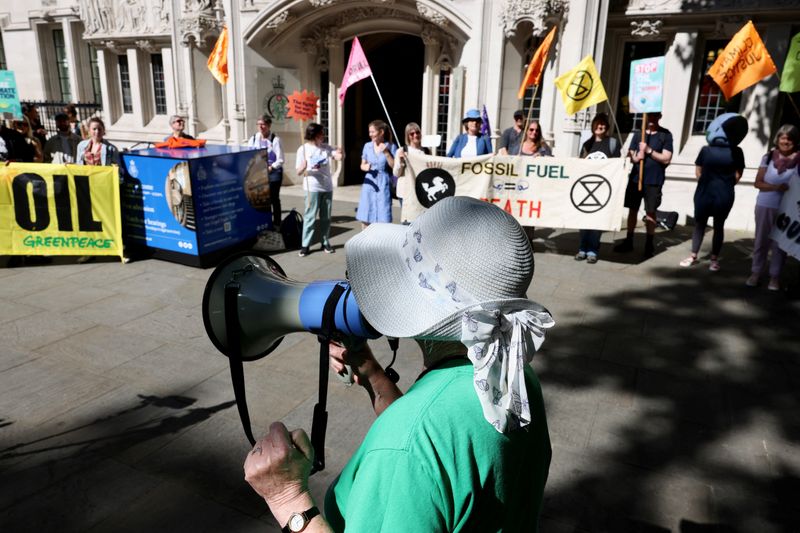Commodities
Environmental activists win landmark ruling over UK oil well plan

By Michael Holden
LONDON (Reuters) -Planning authorities should have considered the impact of climate-warming emissions in approving an oil well near Gatwick Airport, the UK’s highest court said on Thursday, a ruling activists say could profoundly impact new fossil fuel projects in Britain.
Environmental campaigners had argued that planning permission to retain and expand the oil well site near London’s Gatwick was flawed because it had not considered the impact of greenhouse gas emissions from the use of the oil.
Supreme Court judges agreed by a narrow three to two majority, and quashed the planning approval which they said was unlawful.
While the court said councils could still approve schemes even if they were likely to cause significant harm to the environment, campaigners said the landmark judgment would make it much harder for new oil, gas and coal developments to get approval.
“This historic ruling is a watershed moment in the fight to stop further fossil fuel extraction projects in the UK and make the emissions cuts needed to meet crucial climate targets,” Friends of the Earth lawyer Katie de Kauwe said.
“It is a huge boost to everyone involved in resisting fossil fuel projects.”
The campaign groups said the ruling could hit proposals for other controversial schemes such a new coal mine in Cumbria, northern England, as well as North Sea oil and gas projects.
“Oil and gas companies will be working through the judgment to assess to what extent it affects future projects in the UK, and existing challenges before the courts, which had been stayed pending the Supreme Court’s decision,” Tom Cummins (NYSE:), partner at law firm Ashurst.
The government said it would carefully consider the impact of the ruling and any relevance for other ongoing legal proceedings.
NEW OIL WELLS
The case concerned a decision in 2019 by Surrey County Council to allow Horse Hill Developments, part-owned by British energy company UK Oil & Gas Plc (UKOG), to retain two oil wells and drill four more over a 20-year period near the town of Horley, close to Gatwick.
An Environmental Impact Assessment (EIA) for the project examined the effect of the construction, production and decommissioning of the site, but did not assess the impact from emissions that would result from the use of the refined oil.
The Weald Action Group (WAG), an umbrella organisation for local groups that campaign against the extraction of oil and gas in southeast England, estimated this would equate to more than 10 million tonnes of carbon emissions.
A campaigner acting for WAG launched a legal challenge against the planning approval on the basis the EIA was flawed, but this was rejected both by the High Court in London and then by the Court of Appeal.
However, the Supreme Court overruled, saying it was inevitable there would be combustion emissions from the refined oil.
“It is not disputed that these emissions, which can easily be quantified, will have a significant impact on climate,” said George Leggatt, one of the three Supreme Court justices who agreed with the appeal.
“The only issue is whether the combustion emissions are effects of the project at all. It seems to me plain that they are.”

UKOG’s CEO Stephen Sanderson said the company’s focus had shifted from oil and gas to underground hydrogen storage, but added it would work closely with the local authority to account for “this retrospective change to EIA requirements”.
The council itself said planning permission for the oil well “remains to be determined in due course”.
Commodities
Oil prices rise; U.S. crude inventories plunge, Russia-Ukraine truce eyed
Commodities
India’s Reliance to stop buying Venezuelan oil over US tariffs, sources say
Commodities
Oil prices climb on Venezuela supply worries

 Forex3 years ago
Forex3 years agoForex Today: the dollar is gaining strength amid gloomy sentiment at the start of the Fed’s week

 Forex3 years ago
Forex3 years agoUnbiased review of Pocket Option broker

 Forex3 years ago
Forex3 years agoDollar to pound sterling exchange rate today: Pound plummeted to its lowest since 1985

 Forex3 years ago
Forex3 years agoHow is the Australian dollar doing today?

 Cryptocurrency3 years ago
Cryptocurrency3 years agoWhat happened in the crypto market – current events today

 World3 years ago
World3 years agoWhy are modern video games an art form?

 Commodities3 years ago
Commodities3 years agoCopper continues to fall in price on expectations of lower demand in China

 Economy3 years ago
Economy3 years agoCrude oil tankers double in price due to EU anti-Russian sanctions



























